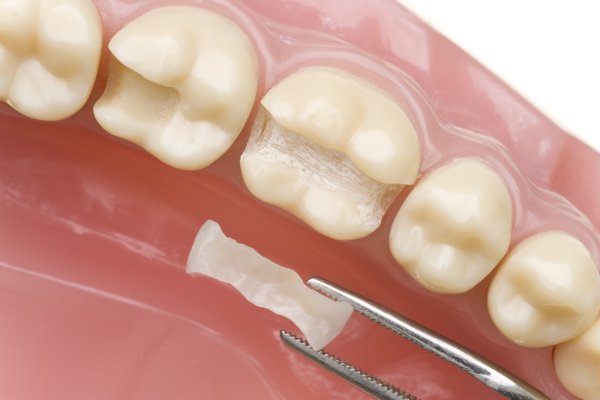The secret to a truly confident smile isn’t just about perfect teeth; it’s about making the right strategic choices when damage occurs. Every year, millions of individuals face the decision between two powerhouse restorative dental prosthesis options: Dental Bonding and dental crowns. These two dental treatments offer solutions for Damaged Teeth, but they serve fundamentally different needs. This guide will walk you through the nuances, ensuring you partner with your dental professional to choose the best solution for your long-term oral health and cosmetic goals.
Dental Bonding: The Minimalist, Cosmetic Dental Treatment
Dental Bonding, often referred to simply as Tooth Bonding or direct resin bonding, is the most conservative and least invasive of the two dental procedure options. It’s a hallmark of modern cosmetic dentistry because it preserves the maximum amount of natural tooth structure.
The Dental Bonding Process
This treatment uses a putty-like, tooth-colored composite resin—the same filling material used for modern dental fillings—which is directly applied to the tooth surface in the dental office.
- Preparation: Unlike crowns, there is minimal to no enamel removal. The tooth enamel is lightly etched with an acid solution to create a better bonding surface.
- Application: The bonding resin is applied and sculpted by the dentistry expert to match the natural shape of the tooth.
- Curing: A specialized curing light is used to rapidly harden the resin material, creating a strong, instant bond.
- Finishing: The material is then trimmed, shaped, and polished to blend seamlessly with the surrounding natural tooth enamel.
Pros of Dental Bonding
| Advantage | Benefit to the Patient |
| Minimally Invasive | Preserves up to 99% of natural tooth structure; involves very little or no tooth filing. |
| Cost-Effective | Significantly less expensive than a dental crown or porcelain veneers. |
| Speed & Convenience | Usually completed in a single dental office visit, requiring minimal time. |
| Aesthetics | The composite resin can be shaded to match the surrounding tooth colored teeth, making repairs invisible. |
Cons of Dental Bonding
| Drawback | Consideration |
| Durability | The resin material is not as strong as porcelain or ceramic and is susceptible to chipping or breaking when biting on hard items like ice cubes or chewing pens. |
| Staining | Composite resin is more porous than natural tooth enamel and can become discoloured over time due to coffee, wine, or tobacco. |
| Limited Scope | Not suitable for large areas of decay or severely cracked or broken tooth structure. |
| Longevity | Requires more frequent maintenance and replacement (typically every 5-10 years) compared to dental crowns. |
Dental Crowns: Strength, Coverage, and Longevity
A dental crown, sometimes referred to as a dental cap, is a tooth-shaped cap that completely covers the visible portion of a Damaged Tooth above the gum line. Unlike a filling or Tooth Bonding, which only repairs a section, a dental crown provides comprehensive coverage, restoring the tooth‘s strength, shape, and function.
The Dental Crown Procedure
The dental crowns procedure typically involves two dental visits because the permanent dental prosthetic is created in an external dental laboratory.
- Preparation (Visit 1): The decaying tooth is prepared by removing the outer layer of natural tooth enamel and damaged structure to create a strong base metal alloys (or other material) for the crown. Dental impressions (tooth impressions) are taken, and a temporary crown is placed to protect the prepared tooth while the permanent one is being fabricated by dental technicians.
- Cementation (Visit 2): The temporary crown is removed, and the permanent dental crown, received from the dental lab, is checked for fit, color, and bite. Once perfect, it is permanently secured with strong dental cement.

Types of Dental Crowns
The choice of dental materials impacts strength and aesthetics:
- All-Ceramic Crowns (Porcelain Crowns): Made entirely of ceramic material or porcelain, these are the most aesthetic ceramic options, offering a superb match to surrounding teeth. Porcelain crowns are ideal for visible front teeth.
- Zirconia Crowns: Constructed from zirconium dioxide, a highly durable and tooth colored ceramic material, the zirconia crown offers the best balance of aesthetics and strength. They are an excellent option for molars and bridges. The Zirconia dental crown is a top choice for modern dentistry.
- PFM Crowns (Porcelain-Fused-to-Metal): These combine a porcelain outer layer with a metal base or metal alloys substructure, offering strength but sometimes showing a dark metal line near the gum line.
- Metal Crowns: Historically using Gold alloy dental crown or base metal alloys, these are extremely durable and require minimal tooth structure removal, but are generally reserved for unseen molars.
Pros of Dental Crowns
| Advantage | Benefit to the Patient |
| Maximum Strength | Provides complete coverage and protection, essential for severe breaks, cracks, or after a root canal therapy. |
| Longevity | With proper dental hygiene, they last 15-25 years, often considered a permanent solution. |
| Aesthetics (Modern Crowns) | All ceramic crowns and zirconia crowns offer superior, long-lasting cosmetic results. |
| Structural Integrity | Restores the entire oral function of a weakened tooth, improving bite and chewing ability. |
Cons of Dental Crowns
| Drawback | Consideration |
| Invasive Procedure | Requires significant tooth structure removal (irreversible enamel removal). |
| Cost | Significantly more expensive than Dental Bonding. |
| Timeframe | Requires a minimum of two dental visits over several weeks due to dental lab fabrication. |
| Sensitivity | Temporary sensitivity in the prepared tooth is common after the first visit. |
When to Choose Which Dental Treatment
The choice between Dental Bonding and a dental crown is always determined by the extent of the dental issues and the long-term prognosis for the tooth.

Choose Dental Bonding When…
- You have minor cosmetic dental concerns such as small gaps (often called black triangles) between teeth, minimal chips, or slight surface imperfections.
- You want a fast, affordable solution for minimal discoloured areas that resist teeth whitening.
- The tooth is structurally sound, and you want to avoid significant tooth structure alteration.
- You are considering future treatments like porcelain veneers or composite resin veneers but need an immediate fix.
Choose a Dental Crown When…
- The tooth has undergone root canal treatment (root canal) and needs full protection to prevent fracture.
- The tooth is severely fractured, cracked, or has massive tooth decay that a large filling cannot support.
- You are restoring dental implants or anchoring a dental bridge (Tooth bridges require dental caps for support).
- The tooth is misshapen or significantly crooked, and you require a total overhaul of its shape and size to improve overall oral function.
- You are replacing older, failing metal or PFM crowns.
Prioritizing Oral Health: The Role of Delta Park Dental
Regardless of your chosen dental procedure, your success relies on dental care partnership and consistent oral hygiene. Following any cosmetic treatment, diligent flossing and proper Tooth brushing remain essential for protecting the gum line and extending the life of your dental prosthetic. Regular dental visits, including dental examinations with dental x-rays, are vital for catching early signs of wear, secondary tooth decay, or other dental concerns.
Why Choose Delta Park Dental?
At Delta Park Dental, we specialize in Restorative and cosmetic dentistry, offering every ceramic option from precise direct resin bonding to durable zirconia crown solutions. Our dental professional team utilizes advanced dental equipment like the VALO LED Curing Light to ensure superior bonding strength and color matching. We provide transparent advice to help you maximize your dental plan benefits and choose the ideal, long-lasting solution for your unique smile.

Conclusion
Ultimately, the decision between Dental Bonding and a dental crown boils down to the severity of the damage. Bonding is the conservative, one-visit cosmetic treatment for minor issues, while the crown is the strongest, long-term restorative solution for structurally compromised teeth. Both are powerful tools for preserving your oral health and confidence.
Don’t let damaged teeth compromise your oral health or confidence. Contact Delta Park Dental today to schedule your restorative consultation.
Tags
- Dental Bridges
- Veeners Dental
- Veeners Dental Near Me
- Root Canal Treatment near me
- Dental Bonding In Brampton
- Bridge Dental Brampton
- Dental Bridge Brampton
- Emergency Dental Brampton
- Dental Bridges Near Me
- Dental Veneers Near Me
- Veneers Dental
- Root Canal Therapy
- Dental Emergency Near Me
- Emergency Dentistry
- Brampton Dental Implant
- Dental Implant Brampton
- Dental Implant
- Dental Implant in Brampton
- Dental Veneers
- Dental Veneer
- Dental Filling Before and After
- Whiten Teeth
- crown dental implant
- Dental Crown in Brampton
- Whitening Teeth
- Wisdom Teeth Removal
- Dental Bonding
- Dental Bonding Near me
- Dental Crown Near Me
- Dental Crown Brampton
- Wisdom Teeth Extraction
- Wisdom Tooth Removal
- Dental Crown
- Dental Teeth Whitening
- Wisdom Tooth Extraction
- Dental Filling Brampton
- Dental Filling
- Teeth Whitening Dentist
- Dental Fillings
- Teeth Extraction
- Dental Filling Near me
- Teeth Whitening Near Me
- Dental Emergency Brampton
- Tooth Extraction
- Emergency Dentistry Services



